In big-hearted political speeches, analysts are often informed not by what is said, but by what the speaker does not say at all. One of the things that left many observers discontented about Ursula von der Leyen’s September annual assessment this year was that the Commission President did not say a word about her future plans, including whether she would run for her current post for another five years.
Of course, those familiar with the dramaturgy of EU institutional appointments could hardly have been surprised by von der Leyen’s silence.
The unwritten rule is that if you apply too early for a position, you will swiftly get eliminated in the competition. But listening to the von der Leyen Commission’s last annual report with a hollow ear, it is clear that the speech did not lack information in the issue of succession, at most it was well-packaged.
The Commission President, whose five years in office have been dominated by crisis management from start to finish, perhaps not coincidentally, placed great emphasis on the achievements of the body she chaired in her annual State of the Union account. The former German defence minister is not universally liked in Brussels and beyond, but as the parliamentary debate following her speech showed, few would dispute her undeniable merit in helping the EU weather the storms of recent years: the pandemic that froze the EU economy and claimed many lives, on the front concerning climate change, or the war in Ukraine.
Von der Leyen and her team’s performance is judged in hindsight by the fact that, when she was elected, she hit with almost geometric precision the priorities that are still valid today, and which have not been changed by Covid, which no one suspected in 2019, or by Russian aggression.
These are: the so-called ‘twin transition’, the green and digital transition, strengthening the geopolitical weight of the EU as a sleeping economic giant, defending democracy and the rule of law, and social justice. It is precisely because of the modest progress made in these last areas that the Commission President has come in for the most criticism from The Left, whose keynote speaker said that “the European house today resembles a shabby caboose”.
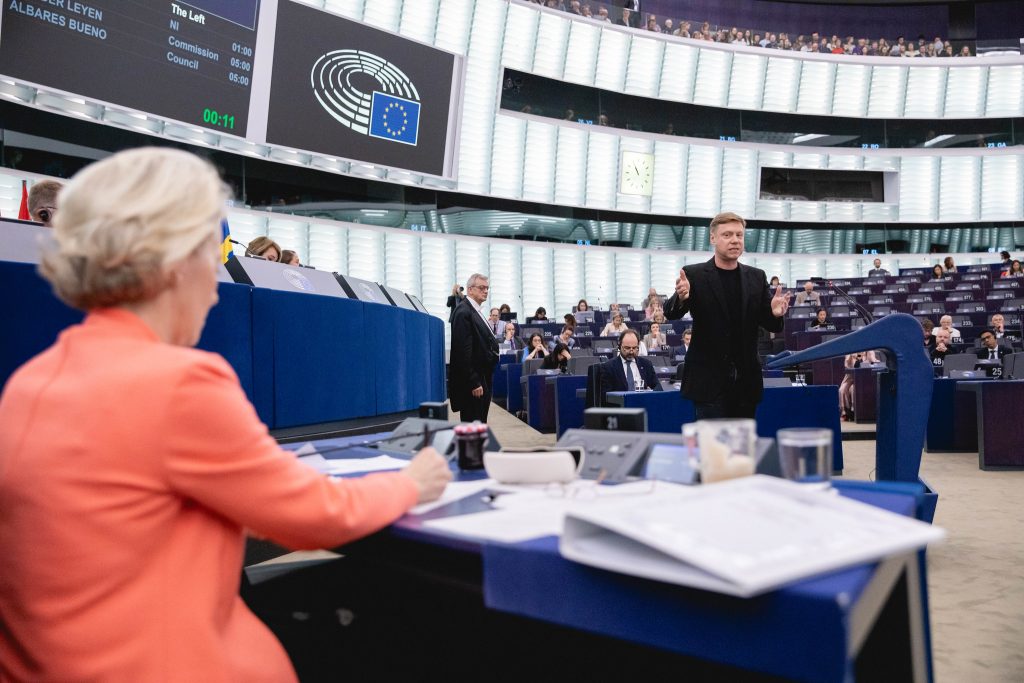
MEP Martin Schirdewan, co-chair of The Left party group, addressing Commission President Ursula von der Leyen after her State of the Union speech (Photo: The Left / Flickr.com)
Von der Leyen was therefore already well aware of the main points of emphasis from the outset, without realising how dramatically topical they would soon become.
But we know from the EU’s “handbook” that crisis is always an opportunity, the question is whether leaders recognise it in time and respond in the right way.
It is also common wisdom that in times of crisis – especially when challenges arise in areas where EU competence is weak or non-existent – it is usually the Member States that take the lead, which puts intergovernmental solutions first.
This recipe has been largely the same in recent years, but the weight of the European Commission (let’s call it Brussels) has significantly increased by the fact that European solutions have helped on most issues, rather than the lowest common denominator of 27 Member States.
For the first time in EU practice, it was not the Member States or the Council but the European Commission that proposed sanctions against Russia (eleven packages in all), and von der Leyen had control over the EU budget.
All this was compounded by a leadership vacuum after the departure of Angela Merkel, who had long stamped her mark on the EU as a whole, and whose replacement, French President Emmanuel Macron was unable to take over, mainly because of internal problems. This, combined with her proximity to Berlin and Paris, gave Ursula von der Leyen even greater influence in the crisis years, and she was appointed as a plan-B candidate in 2019.
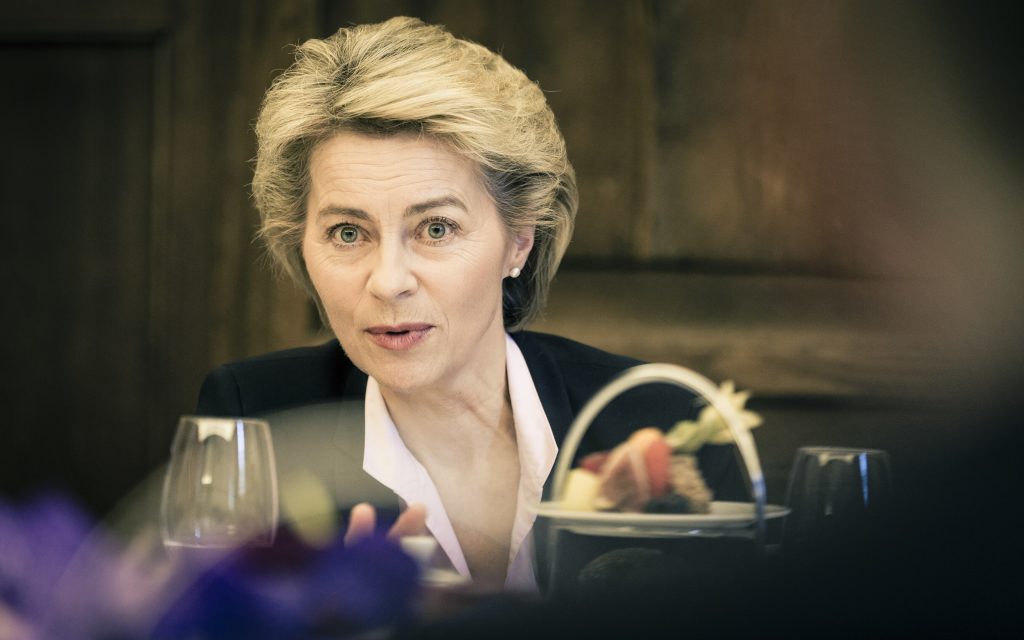
Ursula von der Leyen at the Munich Security Conference in 2017 (Photo: MSC / Kuhlmann)
The German politician, although appointed at the will of the governments, has over the years built up close ties with the EP’s dominant pro-integration groups and the parliamentary majority, taking care not to antagonise the House. In the end, with the exception of the rule of law issues, she succeeded.
So much so that the current majority in the EP would probably support her re-election, just as the majority of member states seem satisfied with the way she is running.
At the same time, her name is also associated with the NATO Secretary General’s seat that will become vacant in a year’s time.
The biggest resonance in Ursula von der Leyen’s annual assessment speech this year was the announcement that the European Commission is launching an anti-subsidy investigation into imports of cheap Chinese electric cars for the first time since the instrument was introduced.
This, in addition to pleasing a number of governments and European car manufacturers, illustrates the turnaround in the long-unilateral EU-China relationship.
A “level playing field” has become the core of the EU’s new geo-economic strategy, along with open strategic autonomy. The underlying idea is that Europe should not become dependent and the plaything of others in the dominant space between the US and China. At the same time, it remains a relevant question whether the EU’s pure technological ambitions, such as the production of electric cars or semiconductors on European soil, will not be embedded in new dependencies due to the lack of the necessary raw materials.
But standing on our own feet and becoming stronger is not only justified because of China or Russia. Donald Trump’s possible return to the White House could change everything at a stroke: the course of the war in Ukraine and the US commitment to European security. Therefore, there is no time to lose, the EU must multiply its resilience to avoid collapsing under increasing pressure.
But, other mines may also explode on the long road Europe has embarked on towards greater autonomy and agency. It is not clear whether a globally unprecedented ambitious and comprehensive climate policy will not cripple European industry or, as von der Leyen proclaims, become the EU’s new growth model. In her speech, the Commission President, obviously with the election campaign in mind, therefore placed great emphasis on the re-industrialisation of Europe. But this will be based on revolutionary clean technologies, rather than a return to the old, outdated model, and will require a whole new skill-set from a workforce that is increasingly in short supply in an EU that is also suffering from a demographic crisis.
A major problem here may be that the EU, including Member States struggling with fiscal consolidation, is apparently unable to inject sufficient funds into the adventure, which may make more sense than the defensive use of market protection instruments.
Looking back on the record of her five-year presidency, von der Leyen can claim as a success the acceleration of the green and digital transition, which seems the right decision in the light of the fact that the EU has been able to move away from Russian fossil energy imports in record time, albeit at a considerable cost. A similar breakthrough could be the conclusion of the eight-year-long debate on the migration pact, although there are many indications that the solution was dictated primarily by fear of the advance of populists and demagogues, not necessarily by thoughtfulness.
EU enlargement, as the Annual Review has shown, could be a major project for the next European Commission and von der Leyen’s successor. In the wake of the war in Ukraine, enlargement has gone from being a category of the dead to a strategic-security issue for the EU, but one that carries significant risks if the EU is unable to renew itself internally and prepare itself institutionally, politically and financially for change. Sooner rather than later, this will inevitably require a rethink of the EU as a whole and a revision of the Treaties.
As can be seen above, during the von der Leyen era, the EU has stumbled from crisis to crisis and has begun to develop and partly implement adequate responses. But it is now up to successors to take this work forward and complete it.

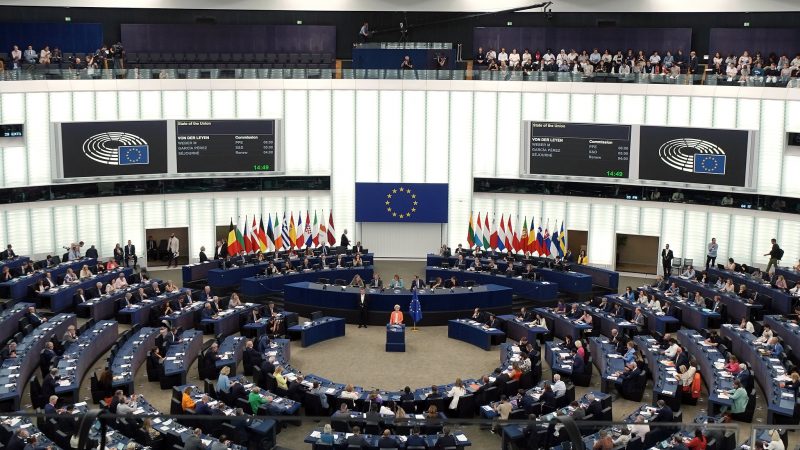
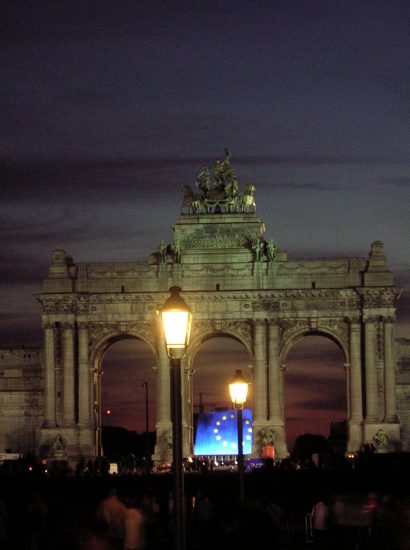
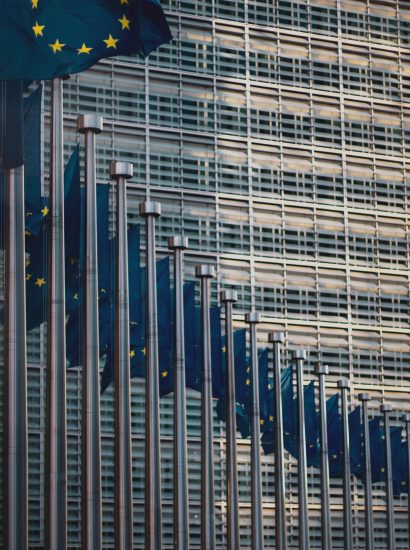
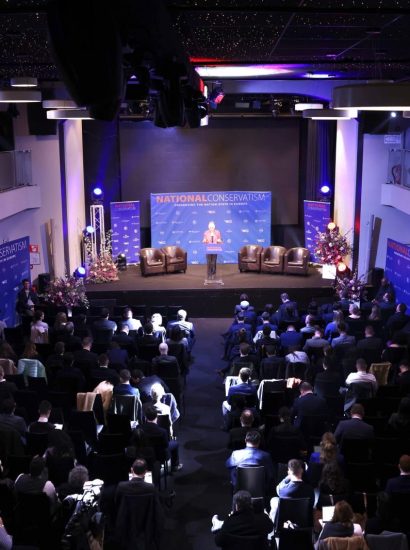
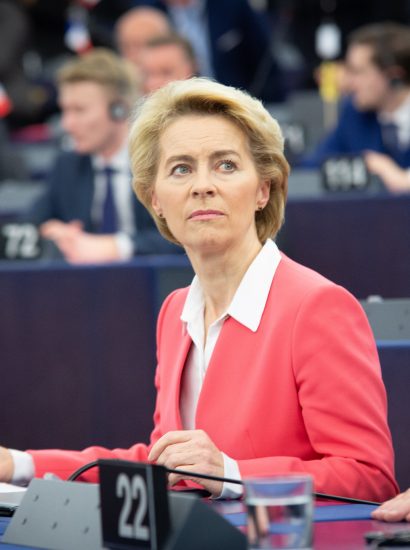
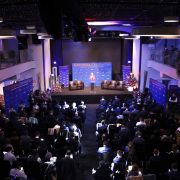

[…] the former German defence minister, who is widely considered to have performed well despite her mistakes over the past five years, and who was elected by a majority of delegates at the European […]
[…] in detail the mistakes made by the European Commission, which should not allow the return of Ursula von der Leyen’s leadership: better agriculture, managed migration, and the cessation of sanctions would stop the war in […]